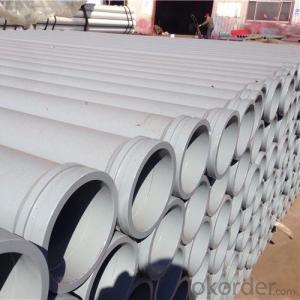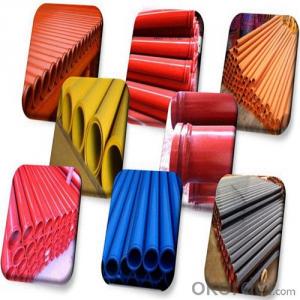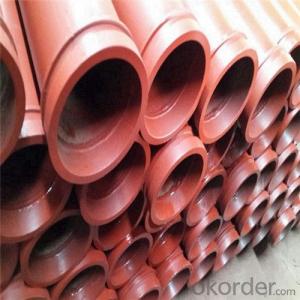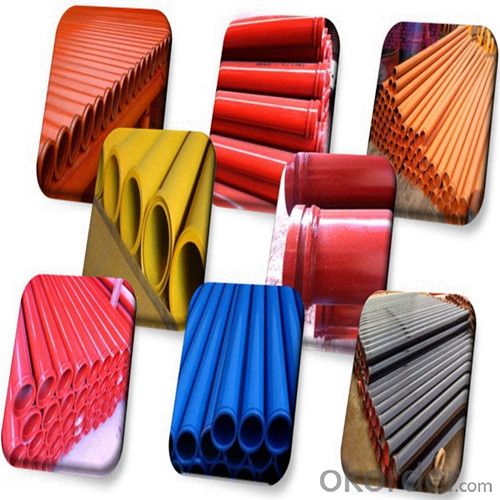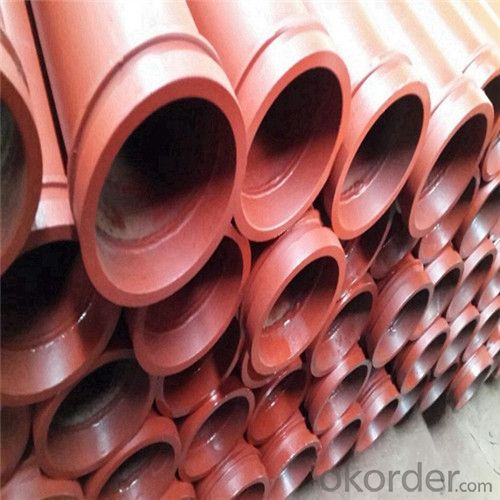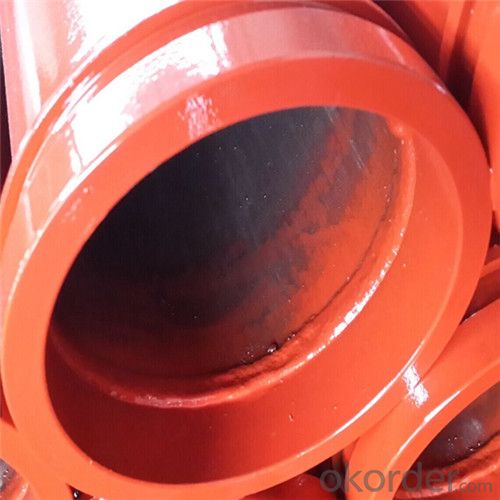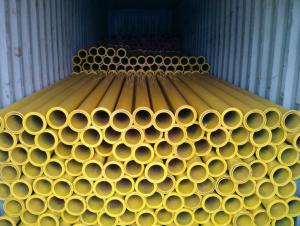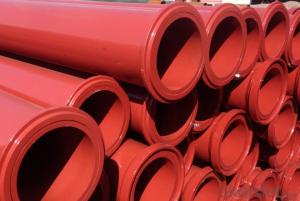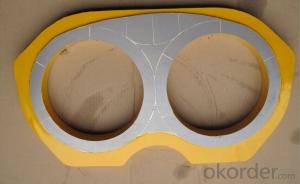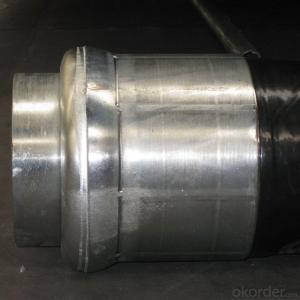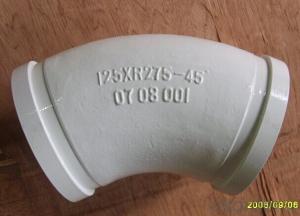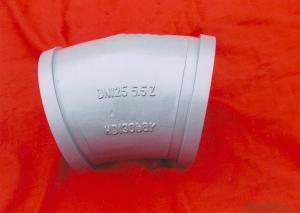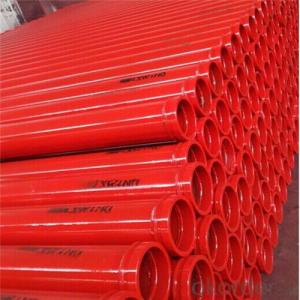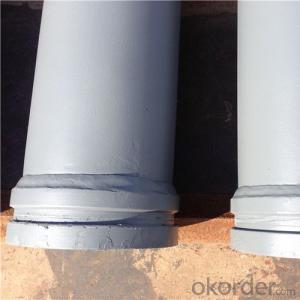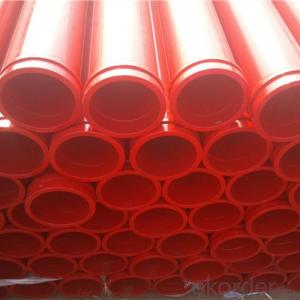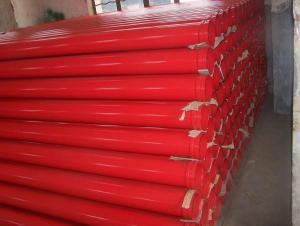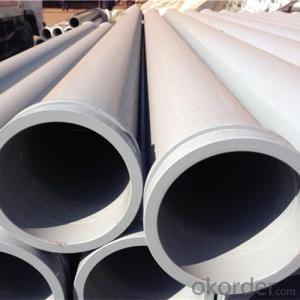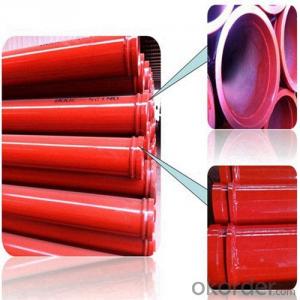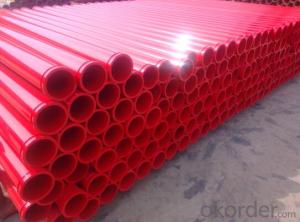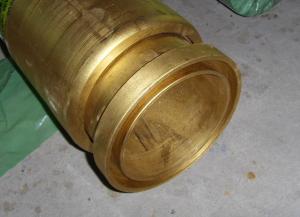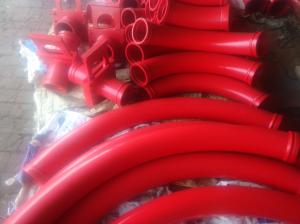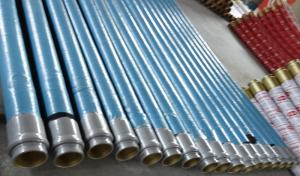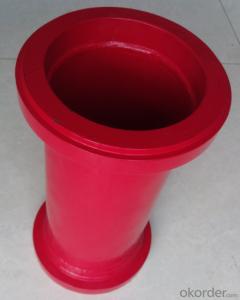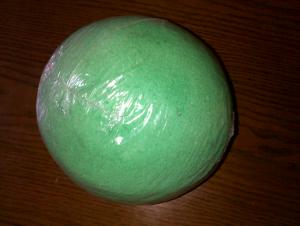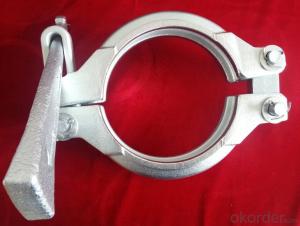3M 45# Steel Delivery Pipe for Concrete Pump
- Loading Port:
- Tianjin
- Payment Terms:
- TT or LC
- Min Order Qty:
- 50 pc
- Supply Capability:
- 5000 pc/month
OKorder Service Pledge
OKorder Financial Service
You Might Also Like
3M 45Mn2 Delivery Pipe for Concrete Pump
1. Structure of 3M 45# Steel Delivery Pipe for Concrete Pump:
St52 Weld Pipe: Main use for Trailer-mounted pump, thickness has 4.0mm, 4.5mm, 5mm. Compare with for Truck-mounted pump. Weld pipe has cheaper price, so it is popular in Saudi, Pakistan, India, etc. Unit Price is about 30USD-33USD.
St52 Seamless Pipe: Now More People like use this kind for Truck Pump and Trailer Pump because of the quality is better and it is seamless kind, so this kind pipe is most popular in Middle East Price About 34USD-37USD.
Wear Resistant Pipe: Use for Truck Pump, Wear Resistant Layer is 2.5mm.Through heat treatment way make this pipe more strong (HRC60-62), Using Life: 25,000m³-35,000m³ Price about 65USD-68USD.
2. Main Features of 3M 45# Steel Delivery Pipe for Concrete Pump:
• High Wear-resistant, long service life, lower cost
• In case of quality problem the company provide free replacement.
• Provide consumers with regular visits
• Ensure the supply of ancillary parts
• Our company passed the ISO9000 certification, the product through 3C certification.
3. 3M 45# Steel Delivery Pipe for Concrete Pump Images
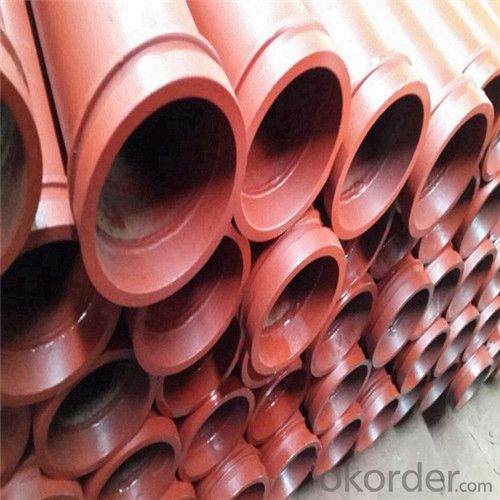
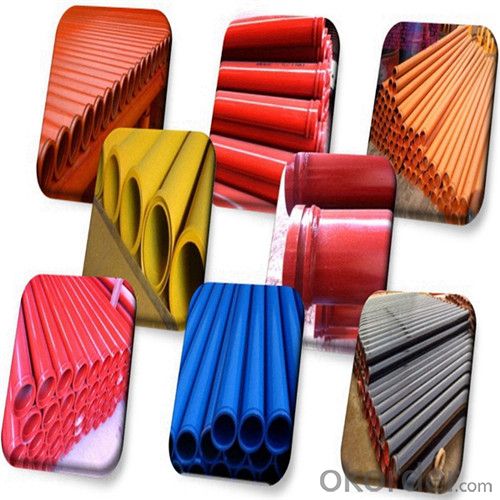
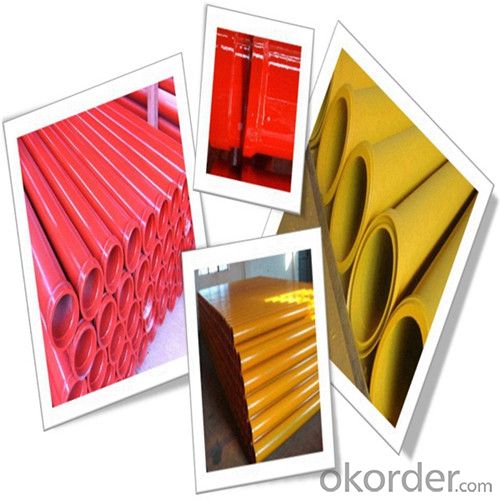
4. 3M 45# Steel Delivery Pipe for Concrete Pump Specification
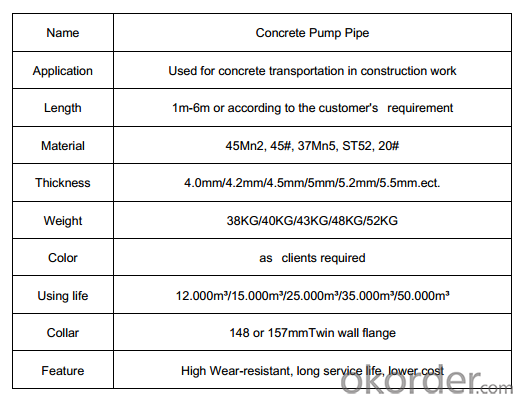
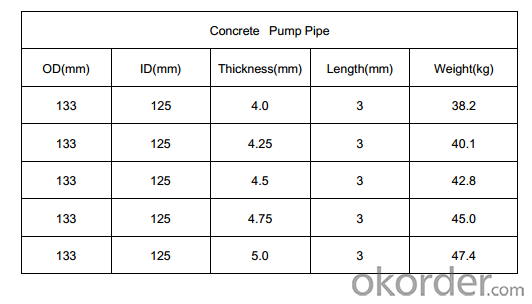
6. Why choose us
• We are a comprehensive manufacturing and trading company.
• Our company is one of the biggest manufacturing and trading companies in China.
• We have been specialized in producing concrete pump spare parts and specialized in producing all kinds of concrete pump parts. As Concrete Pump Pipe, Concrete Pump Elbow, Concrete Pump Rubber Hose, Concrete Pump Wear Plate, Concrete Pump S Valve, Concrete Pump Piston and so on.
• We are famous for our superior quality, competitive prices, first-class craftworks, safe package and prompt delivery.
• We have been supplying concrete pump parts for SCHWING, PUTZMEISTER, SANY, CIFA, KYOKUTO, ZOOMLION for 10 years, so we can promise you the quality and best price.
- Q: What is the function of a concrete pump hopper agitator shaft bearing?
- The function of a concrete pump hopper agitator shaft bearing is to provide support and facilitate smooth rotation of the agitator shaft, ensuring effective mixing of the concrete in the hopper.
- Q: Can concrete pump spare parts be customized for specific pump models?
- Customization of concrete pump spare parts is possible for specific pump models. Concrete pumps are available in various sizes and designs, and each model may have distinct specifications and requirements for its spare parts. To ensure compatibility and achieve optimal performance, it is essential to customize the spare parts according to the particular pump model. This customization may involve adjusting dimensions, materials, and other technical specifications to suit the specific pump model. By customizing the spare parts, a perfect fit is ensured, and the efficiency and longevity of the concrete pump are improved. Furthermore, customization allows for potential enhancements or modifications to the original design, resulting in superior performance and durability of the pump. Therefore, it is vital to collaborate with reputable manufacturers or suppliers who can provide customized concrete pump spare parts for specific pump models.
- Q: How often should hopper screens be cleaned or replaced?
- Hopper screens should be cleaned or replaced on a regular basis, typically every 3 to 6 months, depending on usage and the type of materials being processed. Regular cleaning of the hopper screens is essential to maintain optimal performance and prevent clogging or blockages. If the screens become excessively dirty or damaged, they should be replaced immediately to ensure uninterrupted flow of materials and prevent any potential damage to the equipment. Regular maintenance and inspections of the hopper screens will help to prolong their lifespan and ensure smooth operation of the entire system.
- Q: Are there any specific maintenance practices for concrete pump spare parts?
- Concrete pump spare parts should be regularly inspected for signs of wear or damage. This involves checking for visible defects like cracks, leaks, or any other issues. If any problems are found, the spare parts should be immediately replaced or repaired to prevent further damage. Regular cleaning is also essential for concrete pump spare parts. These parts often come into contact with cement, water, and other substances that can cause build-up and affect their performance. Cleaning them regularly will remove debris and residue, ensuring optimal functionality. Lubrication is another important maintenance practice for concrete pump spare parts. Properly lubricating moving components like bearings, seals, and pistons reduces friction and wear, extending the lifespan of the parts. It's crucial to use the correct lubricants recommended by the manufacturer and follow their application guidelines. Proper storage is also vital for maintaining spare parts. They should be stored in a clean, dry environment, away from chemicals or substances that could damage them. Additionally, spare parts should be protected from physical damage, such as being dropped or bumped. Lastly, it's recommended to adhere to the manufacturer's maintenance and replacement guidelines. Regular servicing and inspections by qualified technicians can help identify potential issues early on and prevent major breakdowns or failures. In summary, following specific maintenance practices like regular inspection, cleaning, lubrication, proper storage, and adherence to manufacturer's guidelines are crucial for ensuring optimal performance and longevity of concrete pump spare parts.
- Q: How often should concrete pump seals be replaced?
- The frequency at which concrete pump seals should be replaced depends on several factors, including the type of pump, the quality of the seals, the operating conditions, and the maintenance practices. Generally, it is recommended to inspect and replace concrete pump seals every 500 to 1,000 pumping hours or annually, whichever comes first. Regular inspection is crucial to identify any signs of wear or damage in the seals. Common indications for replacement include leaks, excessive vibration, reduced pumping efficiency, or visible degradation of the seal material. If any of these issues are observed, it is essential to promptly replace the seals to prevent further damage and ensure the optimal functioning of the concrete pump. It is worth noting that certain pumps may require more frequent seal replacements due to their design or operating conditions. For example, high-pressure pumps or those used in abrasive environments might experience accelerated wear on the seals, necessitating more frequent replacements. To prolong the lifespan of concrete pump seals, proper maintenance and care are essential. This includes regular cleaning of the pump and seals, ensuring proper lubrication, and following the manufacturer's guidelines for operation and maintenance. Additionally, using high-quality seals and regularly inspecting them for signs of wear can help extend their longevity. Overall, the replacement frequency of concrete pump seals should be determined through a combination of regular inspections, adherence to maintenance practices, and consideration of the specific operating conditions.
- Q: Can I get spare parts for both concrete pumps with and without lubrication systems?
- Spare parts are available for both lubricated and non-lubricated concrete pumps. Various manufacturers and suppliers offer a diverse selection of spare parts for different concrete pump types and models. These spare parts encompass valves, cylinders, pistons, seals, hoses, filters, and more. Regardless of whether your concrete pump is equipped with a lubrication system or not, you can easily locate the required spare parts for its maintenance and repair. It is advisable to consult the manufacturer or a reliable supplier to ensure the procurement of accurate spare parts that match your specific concrete pump model.
- Q: How often should the concrete pump cylinder be replaced?
- The frequency at which the concrete pump cylinder needs to be replaced depends on various factors such as the amount of usage, the quality of concrete being pumped, and the maintenance and care given to the pump. Typically, a concrete pump cylinder can last for several years if properly maintained and serviced regularly. However, it is recommended to inspect the cylinder for signs of wear and tear on a regular basis and replace it whenever there are noticeable signs of damage or deterioration. It is always better to be proactive and replace the cylinder before it fails completely to avoid any potential accidents or disruptions in the pumping process. Ultimately, it is best to consult the manufacturer's guidelines and recommendations regarding the replacement interval for the specific make and model of the concrete pump cylinder being used.
- Q: What is the function of a concrete pump hydraulic accumulator?
- A concrete pump hydraulic accumulator serves a crucial function in the operation of a concrete pump. Its main purpose is to store and release hydraulic energy, which helps in maintaining a constant and smooth flow of concrete during pumping operations. The hydraulic accumulator acts as a pressure storage tank that is connected to the hydraulic system of the concrete pump. When the pump is not in operation, the accumulator stores pressurized hydraulic fluid. This stored energy can be released when required, such as during the pumping process, providing an additional power source to supplement the main hydraulic system. During concrete pumping, the accumulator assists in maintaining a consistent flow of concrete by compensating for pressure fluctuations in the hydraulic system. It serves as a buffer, absorbing any excess pressure and releasing it back into the system when needed. This helps in preventing pressure spikes or drops, which could otherwise lead to irregular concrete flow or even damage to the pump. Furthermore, the hydraulic accumulator also plays a role in reducing energy consumption and enhancing the overall efficiency of the concrete pump. By storing and reusing energy, it minimizes the need for constant power supply from the main hydraulic system, thereby reducing the load on the pump's engine and improving fuel efficiency. Overall, the function of a concrete pump hydraulic accumulator is to store and release hydraulic energy, ensuring a consistent and smooth flow of concrete during pumping operations, while also contributing to energy efficiency and protecting the pump from potential damage.
- Q: What are the common issues that require replacement of concrete pump spare parts?
- Common issues that often require the replacement of concrete pump spare parts include wear and tear from continuous use, damage caused by debris or foreign objects in the concrete mix, corrosion due to exposure to harsh chemicals or weather conditions, and malfunctioning or worn-out components such as seals, valves, or pistons.
- Q: What are the advantages of using stainless steel components in concrete pump spare parts?
- There are several advantages of using stainless steel components in concrete pump spare parts. Firstly, stainless steel is highly resistant to corrosion and rust. This is particularly important in the concrete pumping industry, as the equipment is constantly exposed to water, chemicals, and abrasive materials. By using stainless steel components, the spare parts are able to withstand these harsh conditions and have a longer lifespan compared to other materials. Secondly, stainless steel has excellent strength and durability. It can withstand high pressure and heavy loads, making it ideal for use in concrete pump spare parts. This ensures that the equipment operates efficiently and effectively, without the risk of failure or breakdown. Furthermore, stainless steel is hygienic and easy to clean. In the concrete pumping industry, cleanliness is crucial to prevent contamination and maintain the quality of the concrete being transported. Stainless steel components can be easily cleaned and sanitized, ensuring that the spare parts meet the highest standards of hygiene. Additionally, stainless steel is known for its aesthetic appeal. It has a sleek and modern look, which can enhance the overall appearance of the concrete pump. This can be especially important for businesses that prioritize their brand image and want to project a professional and high-quality image to their clients. Lastly, stainless steel is environmentally friendly. It is 100% recyclable, meaning that it can be reused and repurposed, reducing the need for new materials and minimizing waste. This makes stainless steel components a sustainable choice for concrete pump spare parts. In conclusion, using stainless steel components in concrete pump spare parts offers numerous advantages such as corrosion resistance, strength, cleanliness, aesthetic appeal, and environmental sustainability. These benefits make stainless steel an excellent choice for the construction industry, ensuring reliable and efficient operation of concrete pumps.
Send your message to us
3M 45# Steel Delivery Pipe for Concrete Pump
- Loading Port:
- Tianjin
- Payment Terms:
- TT or LC
- Min Order Qty:
- 50 pc
- Supply Capability:
- 5000 pc/month
OKorder Service Pledge
OKorder Financial Service
Similar products
Hot products
Hot Searches
Related keywords
